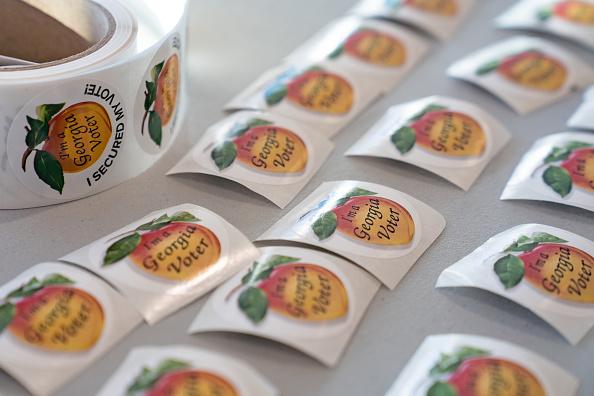ATLANTA— Georgia's secretary of state on Thursday called on a voting technology expert to ask a judge to release a reportdetailing alleged security vulnerabilities in the voting machines used by the state — something the expert had already done.
The report by J. Alex Halderman was filed under seal in July in federal court in Atlanta as part of a long-running lawsuit challenging Georgia's voting machines. Halderman spent 12 weeks examining the Dominion Voting Systems machines used in Georgia and more than a dozen other states and identified "multiple severe security flaws" that would allow attackers to install malicious software, he wrote in a sworn declaration filed in the case.
Halderman, a voting technology specialist and director of the University of Michigan's Center for Computer Security and Society, told The Associated Press in August that he'd seen no evidence the machines' vulnerabilities were used to tamper with the 2020 election, but he said, "there remain serious risks that policymakers and the public need to be aware of."
State and federal officials have repeatedly said there was no evidence of widespread voter fraud during the 2020 election.
The report was initially classified "attorneys' eyes only." That meant the actual parties to the case couldn't see it, only their lawyers and experts could. In a declaration filed with the court in July, Halderman urged public disclosure of a redacted version of his findings.
In a press release Thursday, Secretary of State Brad Raffensperger called on Halderman "to ask the judge to publicly release his findings on Georgia's election system and his pre-2020 election testimony. Halderman was given full access to Georgia's election system by the judge, the equivalent of having the keys and alarm codes to a home then claiming he found a way to break in."

David Cross, a lawyer for some of the voters who filed the lawsuit and engaged Halderman for his expertise, called Raffensperger's comments "highly misleading."
"His lawyers have objected to every request we and Dr. Halderman have made to the Court over the last several months to make the report public and provide it to federal and state election security officials," Cross wrote in an email.
Raffensperger's statement was released as the parties to the lawsuit were on a conference call with the judge in the case. Cross mentioned it to her, saying it's clear all parties in the case now want the report released. He asked the judge to allow a redacted version to be made public.
U.S. District Judge Amy Totenberg has so far been unwilling to make the report public, saying she's concerned that it could be exploited by bad actors. After Cross mentioned Raffensperger's press release, Totenberg said, "I'm disappointed that it got raised this way, in a way that only makes things more challenging."
Vincent Russo, a lawyer for the state, told the judge he'd just become aware of the secretary's statement. At this point, Russo said, keeping the report private "may be doing more harm than good."
While the state's lawyers and Dominion have seen the report, no one in the secretary of state's office had seen it, Russo said. He asked Totenberg if he could share the redacted version with the secretary of state, saying that hadn't been clear from the judge's previous statements.
Totenberg said she always assumed the state's lawyers were going to identify people who needed to see the report. She said it seemed to her that the state's lawyers didn't seem to want "to give it that level of acknowledgement."
The judge said she needs to see a redacted version of the report before deciding whether it can be released. Cross said he could provide a version redacted by Halderman that was previously provided to the state's lawyers.
Halderman, a staunch advocate for hand-marked paper ballots who has long argued that the ballot-marking machines are vulnerable, said the access he had to Georgia's machines allowed him to identify for the first time specific vulnerabilities and the ways they could be exploited.
He did not immediately respond Thursday to requests for comment on Raffensperger's press release.
Dominion President and CEO John Poulus said the company "supports all efforts to bring real facts and evidence forward to defend the integrity of our machines and the credibility of Georgia's elections."
Security assessments of any system "should always include a holistic approach of all safeguards in place, including procedural and technical safeguards," he said in the press release from Raffensperger's office, adding that the review conducted for this case "did not take this approach."
Totenberg previously rejected a request by the Louisiana secretary of state, who sought access because his state uses the Dominion system in question for early voting. She has yet to rule on a request for access filed earlier this month byFox News, which asked for access to the report to aid in its defense against a $1.6 billion defamation lawsuit filed by Dominion. One American News, which has also been sued by Dominion, on Thursday asked the judge for access.




